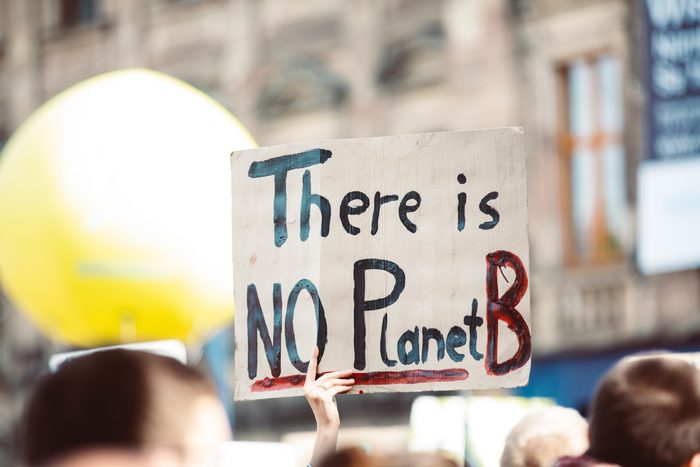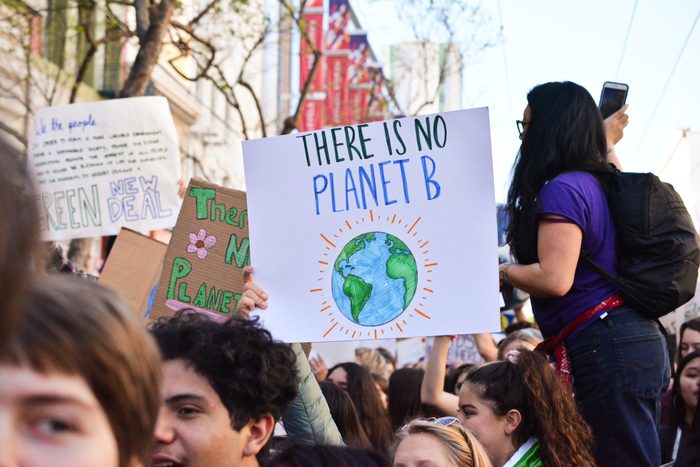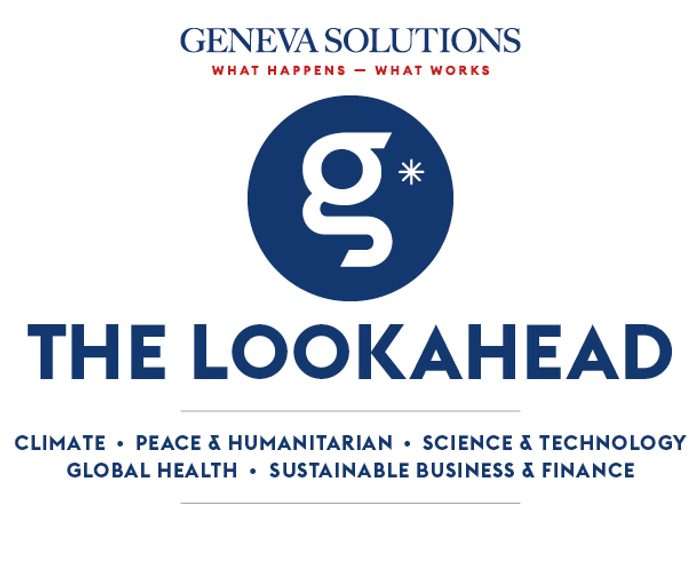Good morning, this is Paula. On Thursday, the head of the Abu Dhabi National Oil Company (Adnoc) will set in motion the Cop28 climate talks, mandated this year to do a reality check on countries' pledges on how they plan to keep global temperatures from continuing their exponential drive upward. We look at some of the key issues that negotiators will have on their agenda.
In what could be seen as an 11th hour nudge to countries to step up climate action, the World Meteorological Organization will publish a couple more reports this week on the alarming state of the climate. Meanwhile, amid the rising pace of disasters, how can designers and humanitarians provide better shelter for displaced populations? |

|

Protest sign at the Global Climate Strike in Erlangen, Germany, 20 September 2019. (Unsplash/Markus Spiske)
|
|
Cop28’s tipping points and search for solutions .
A flurry of scientific reports ahead of the start of the annual climate talks make it clear that countries are far from doing enough to keep global warming from moving into unchartered climate territory. With climate negotiators expected in Dubai to discuss how their countries will step up their carbon-cutting pledges, will known solutions to respond to the challenge be taken seriously this time round? We look at some of the major issues on the Cop28 agenda.
Geneva Solutions (EN)
|
|
|
💬Grand climate speeches.
After Sultan Al Jaber, the chief executive of one of the world’s largest oil companies, officially opens the Cop28 as its president on Thursday in Dubai, over 100 heads of state, including some of the world’s biggest carbon emitters are expected to vaunt their climate policies, while negotiating teams, which arrived a week earlier, will continue to burrow through proposals and trade ideas on how to stick to the target of keeping global temperatures within a 1.5°C rise compared to pre-industrial levels.
More than 35,000 participants are expected to attend the conference, including many eager to be acknowledged from the sidelines of the discussions. These include accredited civil society groups, heads of global corporations, an estimated 2,500 media representatives, the heads of UN organisations and the largest showing of humanitarians, such as ICRC, IFRC and Médecins du Monde. No-shows will include the leaders from the world's top emitting states: US president Joe Biden, China’s president Xi Jinping and India’s prime minister Narendra Modi.
Some are hoping that Al Jaber can rein in neighbouring Saudi Arabia on oil and gas production, though the United Arab Emirates’ Adnoc, according to a recent report, leads fossil fuel producers as the largest net-zero flouting expansion plans of any company globally.
Human rights organisations meanwhile have expressed concern over the safety of environmental and human rights leaders wishing to attend, while certain organisations including Amnesty International cannot enter the UAE, and UN rapporteurs have been unable to carry out country visits since 2014. The Gulf country has said it will allow for activists to “gather peacefully and make their voices heard” in the Green Zone, away from the official Blue Zone area, where talks take place.
|
|
🌡️More climate warnings.
Scheduled to coincide with the conference opening, the World Meteorological Organization will publish a provisional report of the state of the climate in 2023, expected to be the hottest year on record. Catastrophic storms and droughts and erratic weather events, which the WMO predicted earlier this year following the onset of El Niño conditions, have occurred at a sustained pace. One of the latest examples of this was the deadly Category 5 hurricane Otis, which unexpectedly and rapidly scaled up from a tropical storm, hitting Mexico’s Pacific coast and leaving hundreds of thousands of people homeless.
The Intergovernmental Panel on Climate Change’s latest synthesis report, published earlier this year, detailed how global warming was impacting land, oceans and ice caps and glaciers. It also provided solutions on how to reduce greenhouse gas emissions, responsible for climate change.
On Saturday 2 December, the WMO will also issue a report on the global status of early warning systems, which the UN agency has said need to be scaled up in order to protect people against extreme weather and climate change. Earlier this month, the WMO’s State of Climate Services report said climate services should provide tailored information of use to the health sector, to allow it to be better prepared in cases such as poor air quality as well as food and water insecurity.
|
|
💼Corporates and human rights.
While a treaty on business and human rights has been in discussion for years, government representatives, international organisations, civil society groups and academics as well as a light dusting of business representatives will meet again from Monday to Wednesday at the annual UN Forum on Business and Human Rights. While companies will be pressed in Dubai by a UN-endorsed charter to show “credible” emissions reductions targets, at the forum’s 12th session, civil society will make a point of why businesses need to implement human rights and good governance standards throughout their supply chain. In absence of a treaty, the forum will discuss trends and challenges to implementing the 2011 UN Guiding Principles on Business and Human Rights, a voluntary document.
|
|
Also on the agenda
-
📌 27 November | What’s the future of humanitarian design? A critical-pragmatic debate.
Academics, designers and humanitarians will discuss shelter for displaced people, and question whether designs really match needs and what the future of humanitarian design should look like.
Geneva Graduate Institute (EN)

A climate change rally in San Francisco, 2019. (Unsplash/Li-An Lim)
-
📌 28 November | What to expect from COP28?
COP28, the 28th edition of the UN’s international climate meeting, takes place from 30 November to 12 December in Dubai. Finance, health, human rights, fossil fuels: what are the main issues? Can we expect significant progress, or are COPs only "greenwashing" machines, according to Greta Thunberg? Will the launch of the "loss and damage" fund in support of vulnerable countries be launched with substantial pledges from nations as planned? The summit will be the first conference to explicitly examine the link between climate change and global health trends: with what possible conclusions? Join journalists from Geneva Solutions and Health Policy Watch, as well as climate policy experts from CIEL and the Climate Vulnerable Forum, for this lunchtime debate.
Geneva Press Club (EN)
-
For more events, visit the Genève Internationale website.
|
|
GS news is a new media project covering the world of international cooperation and development. Don’t hesitate to forward our newsletter!
Have a good day!
|

|
|
Avenue du Bouchet 2
1209 Genève
Suisse
|
|
|
|









